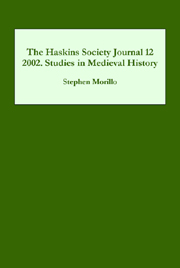Book contents
- Frontmatter
- Contents
- Editorial Note
- Abbreviations
- 1 Religious Houses and the Laity in Eleventh- to Thirteenth-Century England: An Overview
- 2 Two Yorkshire Historians Compared: Roger of Howden and William of Newburgh
- 3 The Rise and Fall of the Anglo-Saxon Law of the Highway
- 4 Consilium et Auxilium and the Lament for Æschere: A Lordship Formula in Beowulf
- 5 Royal Succession and the Growth of Political Stability in Ninth-Century Wessex
- 6 From Anglorum basileus to Norman Saint: The Transformation of Edward the Confessor
- 7 St þorlákr of Iceland: The Emergence of a Cult
- 8 Reshaping the Past on the Early Norman Frontier: The Vita Vigoris
- 9 The Appeal to Original Status in the Angevin Region (Eleventh–Twelfth Centuries)
- 10 Dudo of St. Quentin as an Historian of Military Organization
2 - Two Yorkshire Historians Compared: Roger of Howden and William of Newburgh
Published online by Cambridge University Press: 12 September 2012
- Frontmatter
- Contents
- Editorial Note
- Abbreviations
- 1 Religious Houses and the Laity in Eleventh- to Thirteenth-Century England: An Overview
- 2 Two Yorkshire Historians Compared: Roger of Howden and William of Newburgh
- 3 The Rise and Fall of the Anglo-Saxon Law of the Highway
- 4 Consilium et Auxilium and the Lament for Æschere: A Lordship Formula in Beowulf
- 5 Royal Succession and the Growth of Political Stability in Ninth-Century Wessex
- 6 From Anglorum basileus to Norman Saint: The Transformation of Edward the Confessor
- 7 St þorlákr of Iceland: The Emergence of a Cult
- 8 Reshaping the Past on the Early Norman Frontier: The Vita Vigoris
- 9 The Appeal to Original Status in the Angevin Region (Eleventh–Twelfth Centuries)
- 10 Dudo of St. Quentin as an Historian of Military Organization
Summary
In this paper I hope to get a little further into the minds of two twelfth-century historians: Roger of Howden and William of Newburgh. And I shall try to do so not by using new insights derived from recent theoretical approaches – stimulating though such approaches sometimes are – but by old-fashioned Quellenkritik, the traditional methods characteristic of their nineteenth-century Rolls Series editors, William Stubbs and Richard Howlett. Howden and Newburgh are the two historians on whose evidence two twentieth-century historians – Warren Hollister and Tom Keefe – relied in their 1973 article ‘The Making of the Angevin Empire’ in order to sustain their view that neither Henry I nor Geoffrey of Anjou had intended the union of Greater Anjou with England and Normandy. Seven years later it was, on good narrative evidence, in Tom's room and on the strength of Warren's martinis, that the Haskins Society was founded. I would like to dedicate this paper to their joint memory. I hope that in this way, linking master with pupil, I can appropriately honour a scholar who was also an inspirational teacher who shaped a whole generation of medievalists in his country. Although I shall, as usual, rely principally on the printed editions of chronicles, on this occasion, pushed by the example of two scholars who were themselves so much at home with charters, I shall resort to record evidence in the cause of shedding light on the outlook of those who composed narratives.
- Type
- Chapter
- Information
- The Haskins Society Journal 122002 - Studies in Medieval History, pp. 15 - 38Publisher: Boydell & BrewerPrint publication year: 2003



